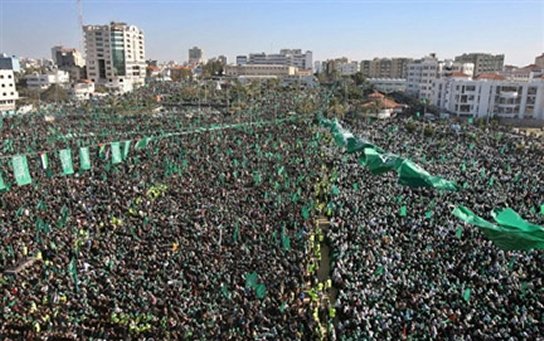« The Secret Service Call It THE BEAST | Main | Funding Islamic Agenda? It's Called Sharia Compliant Finance »
January 09, 2009
Arab Regimes Secretly Rooting For Israel?

Arab regimes secretly rooting for Israel?
Israel is now in the 13th day of carrying out Operation Cast Lead against the Palestinian Islamist movement Hamas in the Gaza Strip, where Hamas has been the de facto ruler ever since it seized control of the territory in a June 2007 coup. The Israeli campaign, whose primary military aim is to neutralize Hamas' ability to carry out rocket attacks against Israel, has led to the reported deaths of more than 560 Palestinians; the number of wounded is approaching the 3,000 mark.
The reaction from the Arab world has been mixed. On the one hand, a look at the so-called Arab street will reveal an angry scene of chanting protesters, burning flags and embassy attacks in protest of Israel's actions. The principal Arab regimes, however, have either kept quiet or publicly condemned Hamas for the crisis — while privately often expressing their support for Israel's bid to weaken the radical Palestinian group.
Despite the much-hyped Arab nationalist solidarity often cited in the name of Palestine, most Arab regimes actually have little love for the Palestinians. While these countries like keeping the Palestinian issue alive for domestic consumption and as a tool to pressure Israel and the West when the need arises, in actuality, they tend to view Palestinian refugees — and more Palestinian radical groups like Hamas — as a threat to the stability of their regimes.
One such Arab country is Saudi Arabia. Given its financial power and its shared religious underpinnings with Hamas, Riyadh traditionally has backed the radical Palestinian group. The kingdom backed a variety of Islamist political forces during the 1960s and 1970s in a bid to undercut secular Nasserite Arab nationalist forces, which threatened Saudi Arabia's regional status. But 9/11, which stemmed in part from Saudi support for the Taliban and al Qaeda in Afghanistan, opened Riyadh's eyes to the danger of supporting militant Islamism.
Thus, while Saudi Arabia continued to support many of the same Palestinian groups, it also started whistling a more moderate tune in its domestic and foreign policies. As part of this moderate drive, in 2002 King Abdullah offered Israel a comprehensive peace treaty whereby Arab states would normalize ties with the Jewish state in exchange for an Israeli withdrawal to its 1967 borders. Though Israel rejected the offer, the proposal itself clearly conflicted with Hamas' manifesto, which calls for Israel's destruction. The post-9/11 world also created new problems for one of Hamas' sources of regular funding — wealthy Gulf Arabs — who grew increasingly wary of turning up on the radars of Western security and intelligence agencies as fund transfers from the Gulf came under closer scrutiny.
Meanwhile, Egypt, which regularly mediates Hamas-Israel and Hamas-Fatah matters, thus far has been the most vocal in its opposition to Hamas during the latest Israeli military offensive. Cairo has even gone as far as blaming Hamas for provoking the conflict. Though Egypt's stance has earned it a number of attacks on its embassies in the Arab world and condemnations in major Arab editorial pages, Cairo has a core strategic interest in ensuring that Hamas remains boxed in. The secular government of Egyptian President Hosni Mubarak is already preparing for a shaky leadership transition, which is bound to be exploited by the country's largest opposition movement, the Muslim Brotherhood (MB).
The MB, from which Hamas emerged, maintains links with the Hamas leadership. Egypt's powerful security apparatus has kept the MB in check, but the Egyptian group has steadily built up support among Egypt's lower and middle classes, which have grown disillusioned with the soaring rate of unemployment and lack of economic prospects in Egypt. The sight of Muslim Brotherhood activists leading protests in Egypt in the name of Hamas is thus quite disconcerting for the Mubarak regime. The Egyptians also are fearful that Gaza could become a haven for Salafist jihadist groups that could collaborate with Egypt's own jihadist node the longer Gaza remains in disarray under Hamas rule.
Of the Arab states, Jordan has the most to lose from a group like Hamas. More than three-fourths of the Hashemite monarchy's people claim Palestinian origins. The kingdom itself is a weak, poor state that historically has relied on the United Kingdom, Israel and the United States for its survival. Among all Arab governments, Amman has had the longest and closest relationship with Israel — even before it concluded a formal peace treaty with Israel in 1994. In 1970, Jordan waged war against Fatah when the group posed a threat to the kingdom's security; it also threw out Hamas in 1999 after fears that the group posed a similar threat to the stability of the kingdom. Like Egypt, Jordan also has a vibrant MB, which has closer ties to Hamas than its Egyptian counterpart. As far as Amman is concerned, therefore, the harder Israel hits Hamas, the better.
Finally, Syria is in a more complex position than these other four Arab states. The Alawite-Baathist regime in Syria has long been a pariah in the Arab world because of its support for Shiite Iran and for their mutual militant proxy in Lebanon, Hezbollah. But ever since the 2006 war between Israel and Hezbollah, the Syrians have been charting a different course, looking for ways to break free from diplomatic isolation and to reach some sort of understanding with the Israelis.
For the Syrians, support for Hamas, Palestinian Islamic Jihad and several other radical Palestinian outfits provides tools of leverage to use in negotiating a settlement with Israel. Any deal between the Syrians and the Israelis would thus involve Damascus sacrificing militant proxies such as Hezbollah and Hamas in return for key concessions in Lebanon — where Syria's core geopolitical interests lie — and in the disputed Golan Heights. While the Israeli-Syrian peace talks remain in flux, Syria's lukewarm reaction to the Israeli offensive and restraint (thus far) from criticizing the more moderate Arab regimes' lack of response suggests Damascus may be looking to exploit the Gaza offensive to improve its relations in the Arab world and reinvigorate its talks with Israel. And the more da mage Israel does to Hamas now, the easier it will be for Damascus to crack down on Hamas should the need arise.
~ snipet ~
Hamas' relations with the Arab states already were souring; its warming relationship with Iran has proved the coup de grace. Mubarak said it best when he recently remarked that the situation in the Gaza Strip "has led to Egypt, in practice, having a border with Iran." In other words, Hamas has allowed Iranian influence to come far too close for the Arab states' comfort.
For complete article please go HERE ~ thank you
I’ll believe this when I see “moderate Arabs” fighting in the Gaza against Hamas. Until such time, the only ones fighting radical Islam are Israel and the US. If we ever go to war with Iran and Syria then we will know what side the Arab regimes take, that's for sure. I would like to believe that there are Arabs totally against the Hamas, it is just too much history showing that won't happen. Not when it requires word and deed to back it up. Posted by Wild Thing at January 9, 2009 02:50 AM
Thought everyone would get a kick out of this e-mail I received. http://boudicabpi.wordpress.com/2009/01/07/mujaheed-hamas-an-alliedaffiliate-of-hamas-gaza/ Read it and the comments and then comment yourselves. Bob A. Posted by: Bob A at January 9, 2009 07:11 AM
The Arab/Persian/islamist world is the definition of devious. They turn on each other when they don't have an outside source to prey on. Posted by: TomR at January 9, 2009 11:52 AM
BobA., thanks for the link to your blog post. I left a comment. Posted by: Wild Thing at January 9, 2009 06:35 PM
Tom, I agree, they a liars and their word even to each other means nothing. Posted by: Wild Thing at January 9, 2009 06:38 PM

Wild Thing's comment............."There may be moderate muslims. But there is no moderate islam." ~ ex-Muslim Ibn Warraq .
 ....Thank you Mark for sending this to me.
....Thank you Mark for sending this to me.
Mark
3rd Mar.Div. 1st Battalion 9th Marine Regiment
1/9 Marines aka The Walking Dead
VN 66-67
Comments
